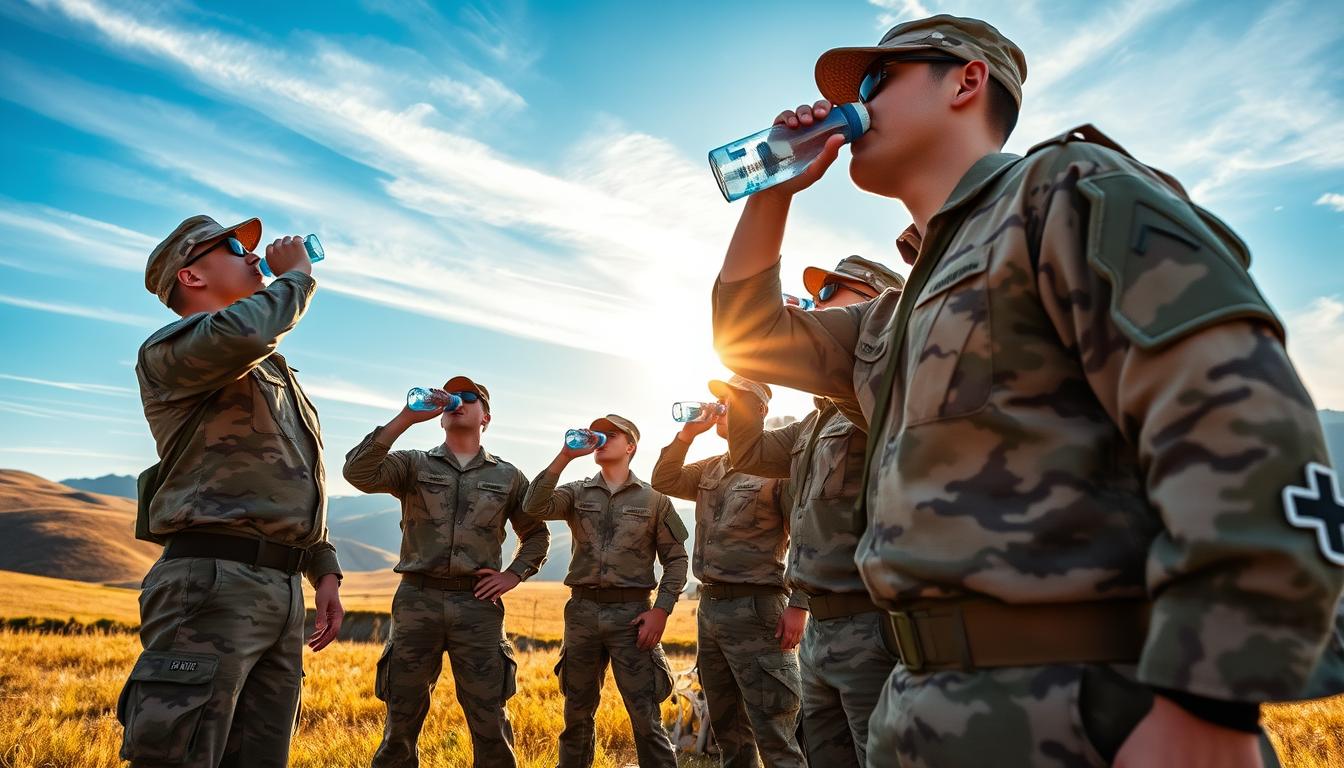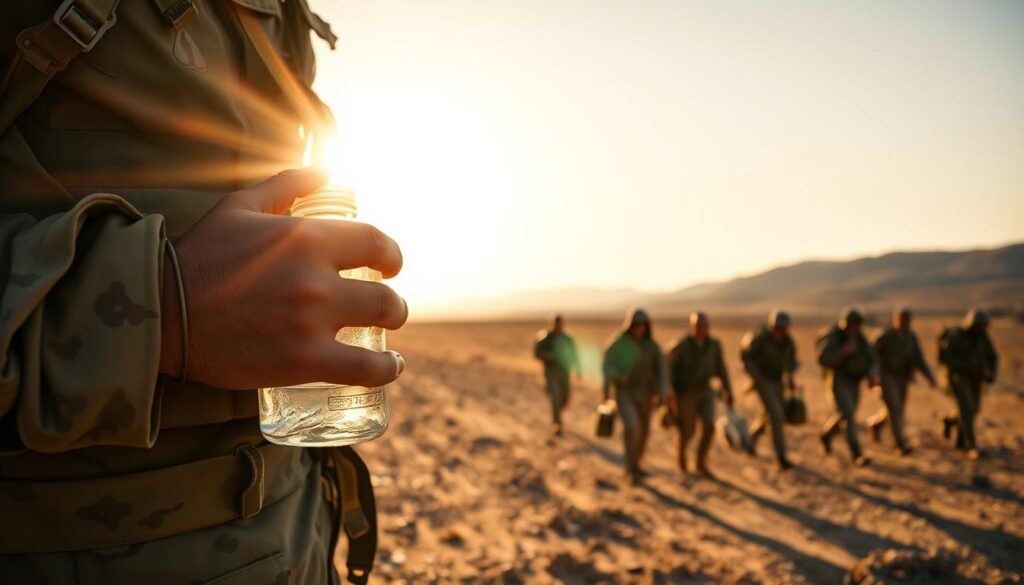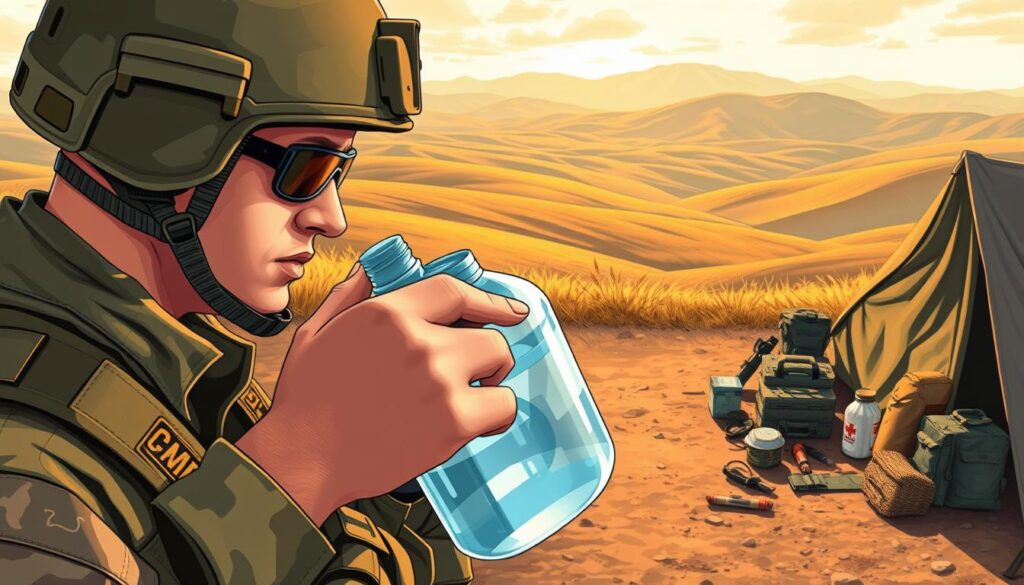Can dehydration be a silent killer on the battlefield? For soldiers, proper hydration is key to staying sharp and avoiding heat sickness.
Capt. Erica Jarmer, a registered dietitian at Blanchfield Army Community Hospital, says, “Hydration for tomorrow occurs today. Hydration for today occurred yesterday.” This shows how vital it is to stay hydrated all the time. Most people need half an ounce of fluid for every pound of their body weight.
The recommended daily water intake changes a lot. It depends on where you are and how hard you’re working, from 2 L/d to over 12 L/d.
Key Takeaways
- Hydration needs are based on body weight.
- Dehydration can impair physical performance.
- Proper hydration is crucial before, during, and after physical activity.
- Daily water requirements can vary greatly.
- Dehydration can lead to severe symptoms.
Understanding the Importance of Hydration for Soldiers
Hydration is key for soldiers, affecting their physical and mental health. It’s vital for their performance in different situations.
The Role of Hydration in Physical Performance
Hydration is crucial for physical performance. Even a little dehydration can lower endurance, strength, and mental sharpness. Adequate hydration helps keep the body cool and moves nutrients and oxygen.
Hydrated soldiers perform better and avoid heat illnesses. Proper hydration also aids in recovery after hard work.
Effects of Dehydration on Soldiers
Dehydration can harm soldiers’ health and performance. It reduces endurance, strength, and mental sharpness. In bad cases, it can cause heatstroke.
Dehydration also hurts cognitive skills like focus, memory, and decision-making. Keeping hydrated is key for mental clarity in military tasks.
Hydration Needs During Different Activities
Hydration needs change with activity level, environment, and individual differences. Soldiers doing hard training or in hot weather need more water. Those in easier conditions need less.
Knowing these needs helps create good hydration plans. Commanders and soldiers must understand these factors to stay hydrated.
- Activity level
- Environmental conditions
- Individual differences
By considering these, military personnel can manage their hydration better. This keeps them performing at their best.
Specific Hydration Requirements Based on Environment
Soldiers in different places need to know how their surroundings affect their water needs. Things like temperature, humidity, and altitude play big roles. They decide how much water a soldier needs to stay hydrated.
Temperature and Humidity Considerations
In hot and humid places, soldiers lose more water because of sweating. High temperatures and high humidity levels mean they need more water than in cooler places. It’s key for soldiers to drink more to avoid dehydration.
In desert areas, soldiers must drink water often to replace lost fluids. The American College of Sports Medicine says people in hot places should drink water all day.
Altitude Effects on Hydration
At high altitudes, the air is thinner and drier, leading to more water loss through breathing. Soldiers at high altitudes need to drink more water to stay hydrated.
Altitude sickness can also cause dehydration because of symptoms like nausea and vomiting. It’s important for soldiers to watch how their body reacts to high altitude and drink enough water.
Hydration Needs During Combat Training
Combat training is tough and increases the need for water. Soldiers in training need to drink enough water and know why it’s important.
Leaders should make sure there are places for soldiers to drink water during training. They should also remind soldiers to drink water often. Checking the urine color and output helps see if soldiers are drinking enough.
Recommended Hydration Strategies
Keeping soldiers hydrated is key for their health and performance. Good hydration strategies help soldiers do their jobs well without dehydration risks.
Daily Water Intake Guidelines
Soldiers should drink half an ounce of fluid for every pound of body weight each day. For instance, a 150-pound soldier needs about 75 ounces of fluid daily. This rule keeps the body’s water balance right, which is vital for health and performance.
Hydration Before, During, and After Physical Activity
Drinking water is not just about one big drink. It’s about keeping fluids up all day, especially when you’re active. Soldiers need to drink water regularly and frequently before, during, and after work or combat to stay hydrated.
Before you start being active, make sure you’re well-hydrated. Drink water often while you’re active. And after, it’s important to rehydrate to replace lost fluids.
Electrolyte Replacement and Sports Drinks
It’s not just water; electrolyte replacement is also crucial, especially during long or hard activities. Sports drinks can help replace lost electrolytes, keeping the body’s balance right.
Electrolytes like sodium and potassium are important for nerve and muscle work. When you’re intensely active, you lose these, which can cause muscle cramps, fatigue, and more if not replaced.
Signs and Symptoms of Dehydration
It’s key for soldiers to spot dehydration early. This helps keep their health and performance up. Dehydration happens when we lose more fluids than we take in. It can cause many health problems.
Knowing the signs and symptoms of dehydration is important. This helps catch it early and treat it right away.
Recognizing Mild to Severe Dehydration
Dehydration can be mild or severe. Mild dehydration shows as thirst, dry mouth, and dark urine. Severe dehydration brings symptoms like less urine, dizziness, and even losing consciousness.
Spotting these signs early is crucial. It stops dehydration from getting worse.
Monitoring Hydration Levels
Keeping an eye on how hydrated you are is key. Check your urine color. If it’s pale yellow, you’re good. Also, watch your weight to see if you’re losing fluids.
Tools for Assessing Hydration
There are tools to check how hydrated you are. Urine analysis strips show your hydration level. Body weight scales track fluid loss. Even advanced devices can give you real-time hydration info.
| Dehydration Level | Symptoms |
|---|---|
| Mild | Thirst, dry mouth, dark urine |
| Moderate | Decreased urine output, dizziness |
| Severe | Loss of consciousness, rapid heartbeat |
Army-Specific Training and Hydration Protocols
The Army has created detailed hydration training for its soldiers. This training teaches the importance of staying hydrated, especially during tough training and missions.
Hydration Training for New Recruits
New recruits get a lot of hydration training early on. They learn:
- How dehydration affects the body
- How to check if they’re hydrated
- Strategies to stay hydrated during training
This training prepares new soldiers to handle their hydration needs right from the start.
Hydration Policies in Different Branches
Each branch of the military has its own hydration rules. For example:
| Branch | Hydration Guideline |
|---|---|
| Army | Emphasizes hydration during basic training |
| Navy | Focuses on hydration during long sea missions |
| Air Force | Highlights hydration for pilots during long flights |
Case Studies on Hydration Practices in the Army
Studies show the Army’s hydration training works well. For instance, a study on desert training found:
Those who drank enough water did better and got sick less often than those who didn’t.
Key findings from these case studies include:
- Drinking enough water lowers the risk of heat sickness
- Hydration training boosts soldier performance
- It’s important to check if you’re hydrated during hard physical activities
Implementing Hydration Plans in the Field
Keeping soldiers hydrated is crucial. Good hydration plans are key to military readiness. They help soldiers stay healthy and perform well on missions.
Logistics of Water Supply During Missions
Getting water to troops in the field is a big challenge. It involves planning how to deliver water. This means figuring out how much water is needed, finding water sources, and making sure it’s safe to drink.
Water Supply Chain Management is vital. It helps keep water flowing to troops. This includes finding reliable water sources and making sure the water is clean. Water purification is key to keeping water safe for drinking.
Hydration Stations and Their Importance
Hydration stations are important for keeping soldiers hydrated. They offer a place for soldiers to get water and drinks with electrolytes. Hydration stations help track and encourage soldiers to drink enough water.
- Provide easy access to water and hydration drinks.
- Enable monitoring of soldier hydration levels.
- Encourage regular water intake.
Adapting Hydration Plans for Extended Operations
Changing hydration plans for long missions is essential. It’s about adjusting strategies based on mission length, environment, and activity level.
For long missions, a flexible hydration plan is needed. This might include rationing water or using purification tablets. Monitoring soldier health and adjusting the plan is crucial.
Educating Soldiers on Hydration Awareness
Teaching soldiers about hydration is key for keeping them hydrated during missions and training. The Army focuses on hydration education. This helps create a culture of staying hydrated among soldiers.
Hydration Education Initiatives
Hydration education is essential for soldiers to know the value of staying hydrated. Training programs teach them to check their hydration and spot dehydration signs.
Ongoing Training Resources
The Army offers many resources for hydration training. These include guidelines for staying hydrated in different situations. Soldiers are urged to learn these to stay hydrated.
Peer Support for Hydration
Peer support is crucial for hydration efforts. Soldiers are urged to support each other in staying hydrated. Together, they can keep their hydration levels up for peak performance.
By focusing on hydration education, the Army ensures its soldiers are effective and safe. This supports the success of its missions.



